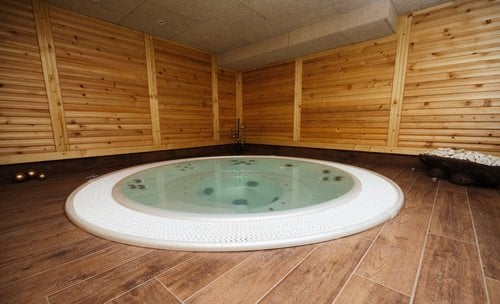Maybe you're considering a hot tub and currently looking at one at your local hot tub store, but aren't sure whether the money you'll put into it for installation and maintenance will be worthwhile. Or perhaps you're buying a home that has a hot tub and aren't sure how that will affect your resale value down the line. Here are the answers to the most common questions about hot tubs when it comes to your home value.
Portable hot tubs, those found on a showroom floor, can be relocated and as such add no value to the home. Even if you have a built-in tub, which sits in the ground like an in-ground swimming pool, it will generally add less value to home than you spent on the feature. Another key factor is the climate; hot tubs to add more value in cooler clients where they can be used year-round.

In addition to the additional cost of the hot tub, which ranges from around $2,000 for the most basic models to at least $20,000 for the built-in variety, you'll be spending a substantial sum on monthly maintenance. Spa services experts estimate these include about $700 a year for pool chemicals, and about $100 a month in added utility costs for every month the hot tub is running. Filters should be changed every few months depending on the model and cost around $45.
Whether you're planning to sell your home or you simply want to make sure your investment lasts, proper care goes a long way. The most attractive hot tubs tend to be the most well-kept, with integrated landscaping and hot tub accessories. They should be tied into the deck area or even surrounded with ceramic tile. Clean the tub thoroughly, and always keep it covered when not in use.
Though a pristine hot tub may add value to the home in some markets, it also narrows your field of potential buyers. Some families with young children might view the hot tub as a safety hazard. If your home is more bachelor pad than suburban spread, a hot tub could definitely attract buyers. If you live in a neighborhood that's attractive to families, you might be narrowing the interest in your home.
An obstacle for some homeowners is finding the right spot on their property for the hot tub. It must be private, close to utilities, and able to support about 1,000 pounds of weight; a deck or cement slab is ideal. If your yard needs to be leveled or needs other preparations, the additional costs can be substantial. You'll also need to run a 220-volt electrical line for many tubs, which can cost up to $1,000.
Most hot tubs have an acrylic lining, which should come with at least a 20-year warranty. This component cannot be replaced, so it limits the lifespan of a tub to around two decades. Other parts of the tub, such as pumps and heaters, should be covered by at least a three-year warranty.
When it comes to hot tubs, it tends to be a wash when it comes to adding value to your home. But if you truly love the idea of taking a soak each night when you get home from work and are able to budget for the additional maintenance and utility costs, this purchase can improve your quality of life dramatically.